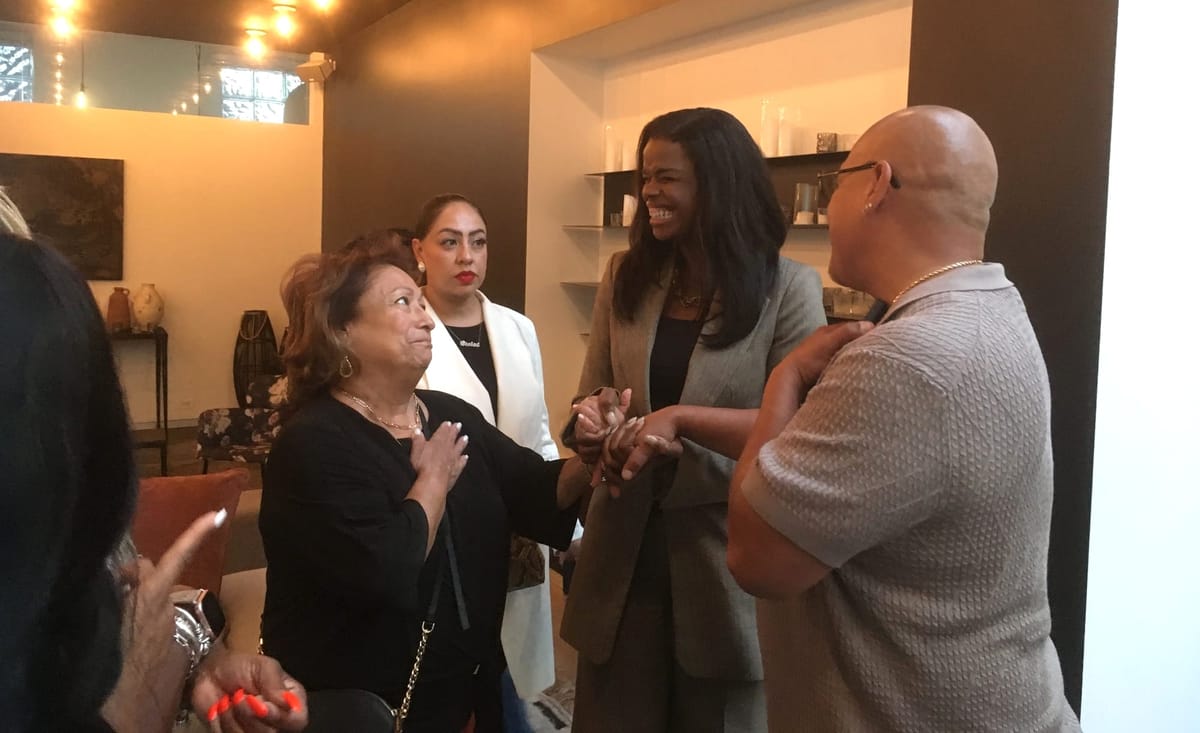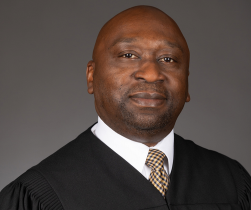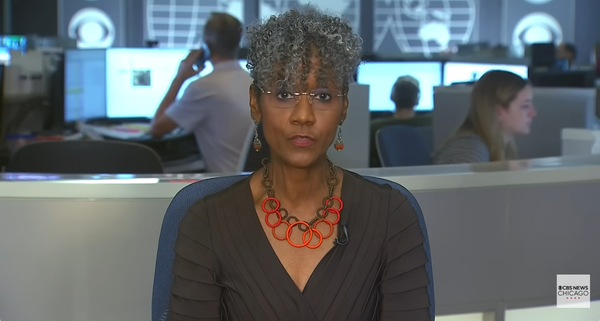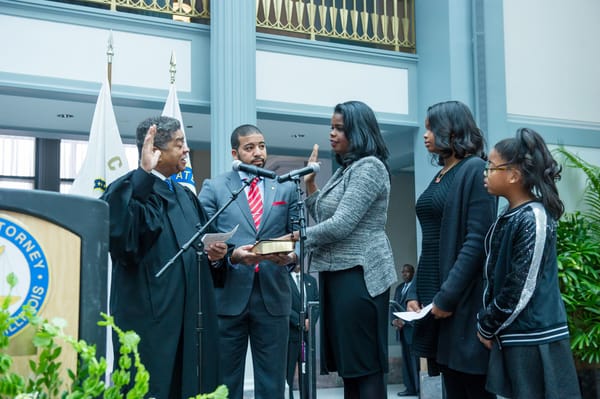Foxx departure leaves uncertain relationship between Cook County prosecutor's office and community

At a "Keeping Up With Kim" event in July 2023 top prosecutor Kim Foxx walked the line between ensuring that her office would pursue justice for victims of crime while also establishing policies aimed at undoing longstanding unfairness in Cook County's criminal justice system, Illinois and across the country.
One of the reforms that Foxx is crediting to her two-decade tenure as a prosecutor is the passage of a law that made Illinois the first state in the country to abolish cash bail.
Foxx took time during that summer evening event at South Suburban College, a 25 mile drive from her offices in downtown Chicago, to respond to misinformation Foxx perceived was aimed at attacking her administration.
"It's not a Kim Foxx policy. It's in the Constitution. The Eighth Amendment says the court shall not impose excessive bail," Foxx said, advising community members that allowing people awaiting a trial to remain free on bail wouldn't result in violent offenders being released.
"There has been so much fear mongering in communities like this about what this means," Foxx said. "We want people who are a threat to our public safety to be detained if they are a threat. And we want people who get charged with a crime who are not able to pay to not sit in jail simply because they are poor."
With members of Foxx's office on hand to take questions from residents about specific cases, the event gave community members an unprecedented access to the top prosecutor along with a glimpse into the inner workings of CCSAO as Foxx took audience questions and shared her decision for not pursuing a third term.
Foxx told the audience that she never planned to be a career politician.
"Don't leave Kim," several audience members called out. When the event ended Foxx shook hands and took selfies with community members.
As she completes her final weekend leading the second largest prosecuting office in the country, community members are uncertain whether or not they will have this connection with the next top prosecutor.
A retired appellate court judge, CCSAO State's Attorney-elect Eileen O'Neill Burke has said that businesses and people were leaving Chicago because of crime. In a candidate questionnaire, Burke said, "I am steadfast in my commitment to reducing the disproportionate incarceration rates of people of color in Cook County."
Foxx's legacy includes being the first prosecutor to engage with activists advocating against the state's legacy of wrongful convictions. During her tenure the parents of people who are serving time for crimes they say they didn't commit had the opportunity to sit across a conference room table with Foxx at her downtown offices to discuss the years long delays in their post conviction cases and their frustration that the system failed to acknowledge the evidence of police misconduct that led to the wrongful conviction.
"Before Foxx we didn't talk to anyone in the state's attorney's office," Bertha Escamilla, a member of the MAMAS, a group of mothers advocating on behalf of people who have been wrongfully convicted. During one meeting at the State's attorney's office Escamilla challenged prosecutions for allowing police officers known for misconduct to continue testify in jury trials.
A year later in 2023 the CCSAO established a "do not call" list.
Raised by her mother and grandmother, Foxx spent some of her formative years as a resident of Cabrini Green, a Chicago housing project. She secured a law degree from Southern Illinois University and came back home to Chicago to work as a guardian ad litem in the public guardian's office. Foxx has made her home in the south suburbs of Cook County. She is the first African American woman to lead CCSAO.
With policies that re-prioritized the county's response to prosecutions for non-violent crimes, Foxx's approach seem to have had a ripple effect around the country with the election of "progressive" prosecutors in Baltimore, Philadelphia and St. Louis.
But it was her efforts to tackle Illinois longstanding problem of wrongful convictions built upon police misconduct, torture and confessions that have found to have been false, that allowed her to become frenemies with the community as well as people in her own office.
Over the past eight years, Foxx's conviction review unit, which had a maximum of 8 people, reversed 253 convictions, including the state's first mass exoneration. For the past five years, Illinois has led the nation in reversing convictions based upon of police and prosecutorial misconduct.
"It's hard to how some cases made it through," Foxx shared with community members at Sept. 30, 2024 event marking International Wrongful Conviction day. where Foxx acknowledge the reluctance prosectors have with reviewing wrongful conviction claims.
"We are evaluated on the things we do in this office so that makes it hard for some people," Foxx said.
Some challenges to justice also include scenarios where a post-conviction case is a judge who decades earlier worked as the prosecutor who pursued charges against the individual.
Personal relationships between police officers and prosecutors also have resulted in conflicts of interest in reviews of wrongful conviction cases.
In his book Torture By Blue, Stanley Howard dissects the cases of a dozen wrongful convictions asserting that the wrongful convictions were the result of CCSAO prosecutors systematically turning a blind eye to police misconduct.
Rather than silence the voices of people, Foxx made it a priority to include their voices into discussion on the direction CCSAO would take while revamping its conviction review unit.
“I don’t know what it’s like to be wrongfully convicted. I don’t know what it’s like to be .... a Burge torture victim,” Foxx told The Triibe in an exit interview. “If we don’t have people with lived experiences sitting on this floor, unapologetic about that, there’s only so far we can go.”
Foxx won't "leave the office with a bang" by resolving another 300 wrongful conviction claims other efforts have reversed convictions as activists like the Campaign to Free Incarcerated Survivors requested in several rallies leading up to Foxx's departure.
But she says other actions have reduced the lasting impact of criminal convictions on the community.
As of 2023 Foxx said that her office vacated more 15,000 convictions for marijuana use after recreational consumption, possession, and sales of cannabis products became legal in the State of Illinois in 2020.
Foxx also counts as wins her decision not to prosecute people for low level offenses, "crimes of poverty" and for driving on suspended licenses after failure to pay tickets.
"I've been very intentional around the policies that I cared about. I did a transition report when I first came to the office and in the transition report, I laid out things that I wanted to address," Foxx said at 2023 community event.
"What I tried to do with the policies that I think are most significant and most transformative in Cook County was not just making them related to me, but embedding them into law. What we've done now has changed how prosecutors offices across the country operate."
At the wrongful conviction day event Foxx's office convened in September, she called on advocates to continue the work with O'Neill-Burke.
A rally outside of the Cook County State's Attorney's Office is set for Dec. 2, 2024. On that day Burke is set to be sworn into office.



